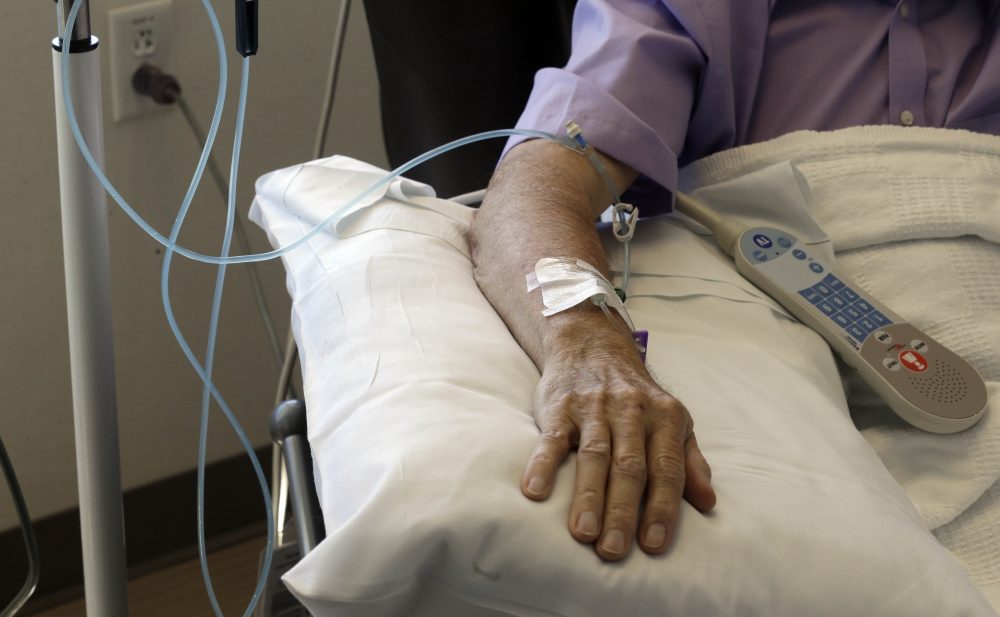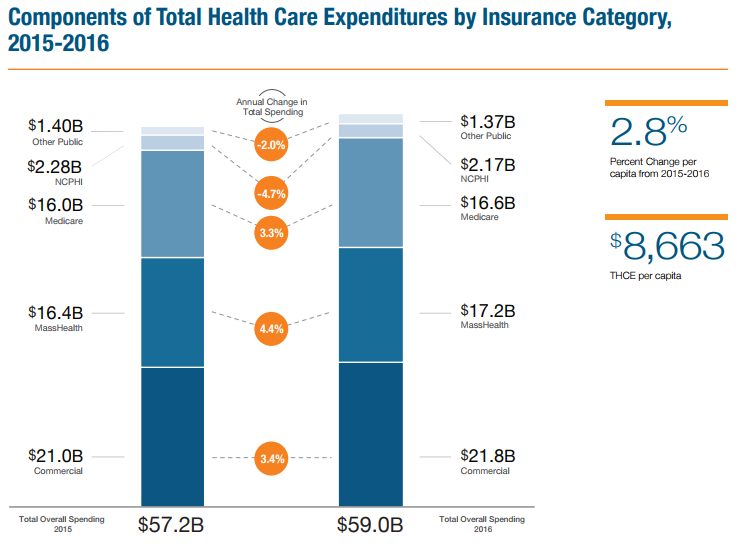Advertisement
Massachusetts Bends Under Health Care Spending Bar In 2016

It's time to announce what happened in the annual health care spending limbo contest in Massachusetts.
The bar for 2016 was set at 3.6 percent. Total health care expenditures were not supposed to increase any faster than that. And the preliminary results show... the state bent to come in well under the bar.
Health care spending grew 2.8 percent last year, to a total of $59 billion.
"Overall health care spending grew at a slower rate than in recent years," said Ray Campbell, director of the Center for Health Information and Analysis (CHIA), the agency that calculates this long-awaited number. "We have seen demonstrable progress on some of the key health care indicators that Massachusetts tracks."

These numbers — 2.8 and 3.6 — will be repeated until they become a veritable mantra in the board rooms of hospitals, health insurers and biotech companies. They will frame intense contract negotiations, debates about the price of drugs and lectures about how to control health care spending. But what do they mean for consumers, employers and the state where health care consumes more than 40 percent of the budget?
On the consumer front, there are some signs of relief. Premiums for individuals who buy insurance on their own declined by 3.4 percent last year. Subsidies available through the Affordable Care Act (which President Trump has said he may end) cut costs for lower-income individuals. But costs may also have dropped if the subsidies persuaded more younger, healthier people to get covered. It's not clear if that was the case.
There was a big jump in the number of people buying individual insurance plans last year, 34.5 percent. And, not surprisingly, there was a slight drop in the number of workers enrolled in coverage through their employer, 0.6 percent. This shift may be part of a pattern of lower-income employees finding that subsidized coverage through the state Health Connector is cheaper than plans offered at work, and employers encouraging workers to enroll in government-sponsored plans.
For residents who get insurance through their employer, premiums rose 3.9 percent. And cost sharing, which includes deductibles and co-pays, was also up — 4.4 percent. Both of these expenses increased faster than wages overall, so many consumers did not feel much, if any, relief.
"The fact that we appear to be under the cost growth benchmark is good news, but if you look at the individual trends and the individual impacts on consumers, we still have a lot of work to do," said Alyssa Vangeli, associate director of policy and government relations at Health Care for All.
Massachusetts is still a high health care costs state. More money is spent on health care for the residents of Massachusetts than any other state except Alaska. Within the $8,663-per-person figure CHIA cites, some areas of spending are rising much faster than others.

"We still see pharma spending far exceeding the cost benchmark and that's where our plans have called for greater transparency on how drug prices are set," said Lora Pellegrini, president of Massachusetts Association of Health Plans.
But the Massachusetts Biotechnology Council -- which represents more than 1,000 biotech companies, academic institutions and nonprofits -- points out that spending on pharmaceuticals grew at half the rate in 2016, as compared with 2015.
"This significant drop happened without any governmental involvement. The market based system incentivizing the continued research and development of new, breakthrough medicines is working as intended," Robert Coughlin, MassBio's president and CEO, wrote in a statement.
Spending on tests and procedures at hospitals that did not include an overnight stay is the second main driver of total health care spending last year, according the CHIA report. That could be a wise use of money, as more care shifts from inpatient to outpatient. But insurers say they state could trim costs further by encouraging patients to get some tests in standalone clinics or a doctor's office, instead of in hospitals.
The state's Health Policy Commission (HPC) will dig into the variables behind these numbers during cost hearings in early October.
HPC Chair Stuart Altman says the 2.8 percent preliminary result is significant, but he prefers to take a longer-term view. He says that in the four years since Massachusetts started measuring health care spending against a benchmark, the state has, on average, stayed at or under a 3.6 percent growth rate.

The final assessment for health spending in 2016 will be released a year from now.
Comparable data for the rest of the country is not yet available, but Altman says it appears that health care spending in Massachusetts continues to grow more slowly than the nation as a whole.
"Over the last several years, Massachusetts growth rates are below the national average," Altman said. "If that continues, that is the most telling statistic. Not only are we keeping health care spending under our benchmark, we are doing things that are better than the rest of the country."
In 2015, health care spending rose 4.8 percent, driven in part by a substantial increase in MassHealth enrollment and spending on pharmaceutical in particular. That trend appears to have slowed in 2016.
“The Baker-Polito Administration has focused on reducing health care spending while delivering quality care to our residents, especially through MassHealth reforms to reach the lowest level of enrollment growth in 10 years," said Gov. Charlie Baker's communications director, Lizzy Guyton, in a statement. "The administration will continue to work with the legislature and the federal government to control health care costs by further reforming MassHealth and the health care market in Massachusetts.”
Partners HealthCare, the state's largest and one of the most expensive health care systems in the state, said in a statement: "Massachusetts hospitals and physicians have made good progress in the effort to curb health care cost growth — but there is more work to be done. Partners will continue to work with state officials, insurers and other health care providers to build upon the good news contained in today's report."
This article was originally published on September 13, 2017.
